Posted January 19, 2021 by Nicky in Reviews / 0 Comments
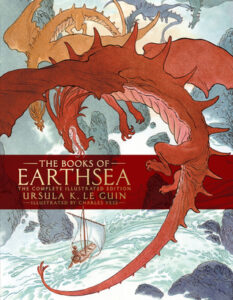 A Wizard of Earthsea, Ursula Le Guin
A Wizard of Earthsea, Ursula Le Guin
I’ve read this I don’t know how many times, and it always charms. This time, I read it in the edition illustrated by Charles Vess, which is just gorgeous — and includes both an introduction by Le Guin and an afterword, which shed a little light on the book and what she thought of it, where it came from, and where it went. If you’ve never read it, A Wizard of Earthsea is a hero’s journey, a fantasy tale with dragons and sea-voyages and magic, but also an inward one.
I still maintain that Ged’s journey makes an excellent metaphor for (how I experience) mental illness. Sometimes the descriptions of the Shadow and the way it haunts Ged are just far too familiar; they fill me with my own anxious dread. But then it’s good to be reminded that when you turn and face it, and hunt it down, and accept it as a part of you… to some degree, things can be overcome.
All that said, I still appreciate that Le Guin came back to Earthsea, and found herself looking at how it came to be such a man’s world, and how it could be fixed, things which her introduction discusses a little.
On a non-story note, I did notice some changes in the illustrated edition. Some were obviously good corrections (my old Penguin had plain-sailing as a “sacred” skill on Roke, while this version has it as “scanted”, which is much more likely)… and others I have arguments with, like changing “in wizardly fashion” to “in wizardry fashion”. I think it was right the first time! And my other comment is that I wish there was an illustration of the otak. My visual imagination is non-existent, though I’ve muzzily over the years somehow come to the conclusion that it’s basically a carnivorous guinea pig.
Rating: 5/5
Tags: book reviews, books, SF/F, Ursula Le Guin
Posted January 15, 2021 by Nicky in Reviews / 0 Comments
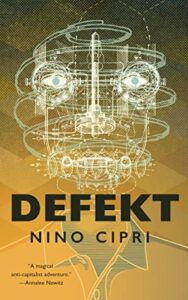 Defekt, Nino Cipri
Defekt, Nino Cipri
Received to review via Netgalley; publication date 20th April 2021
I didn’t love Finna, though I liked it; it felt it leaned a bit too much on being angry about soul-sucking capitalism (which, same, but the choir can get tired of being preached to). Defekt is set in the same world, and briefly crosses over with Finna (we see Jules right before the events of that book), but for whatever reason it worked a bit better for me — it felt a little less preachy, and I loved the idea of all those sentient furnishings. The toilet is a highlight (seriously).
I was a little bit put off by the “self-cest” thing, though: Derek is the main character, and after he takes an uncharacteristic sick day, he has to do a special inventory shift. During the shift, he meets four of his clones, and finds himself particularly drawn to one of them. Sure, that one is quite different to him in many ways, but the potential romance between them was a bit of an odd note for me.
Still, a fun novella, and I suspect those who already enjoyed Finna will enjoy this at least as much.
Rating: 4/5
Tags: book reviews, books, Nino Cipri, queer fic, SF/F
Posted January 13, 2021 by Nicky in Reviews / 2 Comments
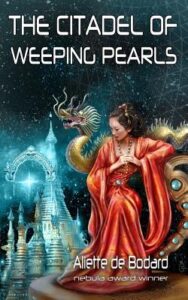 The Citadel of Weeping Pearls, Aliette de Bodard
The Citadel of Weeping Pearls, Aliette de Bodard
I really need to read more of the Xuya stories and novellas all at once, because I like the world but it always takes me some adjustment time. The Citadel of Weeping Pearls stands alone, though, and once you get your head around the fact that it’s based on Vietnamese culture and customs (but in a space empire), it flows along smoothly. Bright Princess Ngoc Minh has been missing for years, along with her Citadel, after her mother the Empress sent armies against her. Grand Master Bach Cuc has been searching for her, and seemed to be close to a breakthrough, but now she’s missing — and Diem Huong, a commoner who lost her mother on the Citadel, is also about to conduct an experiment that may send her to the Citadel.
I found that the only thing that bothered me was the number of POVs, and that was mostly while I was settling into the story. It was obvious why we needed the various POVs by the end; without them, the Empress seems just horrible (instead of a woman who makes horrible decisions believing they are for everyone’s good, which is a different sort of horrible), Ngoc Ha seems too wishy-washy… but together they all work out and show a sad story, examining the bonds between families, and the terrible things an Empress might do for the good of everyone (or not).
It works really well as a novella; I think it’s perfect at this length.
Rating: 4/5
Tags: Aliette de Bodard, book reviews, books, mystery, SF/F
Posted January 7, 2021 by Nicky in Reviews / 2 Comments
 The Faerie Hounds of York, Arden Powell
The Faerie Hounds of York, Arden Powell
The Faerie Hounds of York did not quite go the places I expected it to. It started off with Loxley finding himself in a fairy ring, rescued by a gruff but kind stranger, Thorncress. Warned to leave the area and get himself to London, away from Faerie influence, Loxley quickly finds himself under Thorncress’s care again. A bond is forming between them, as Thorncress tells Loxley he will help him solve his mystery and get free of the Faerie… if it’s possible.
There’s one hell of a moment with this book which I didn’t expect, given the genre; I shouldn’t say too much unless I spoil the impact, because it turned a story I was mildly enjoying into something more intriguing for me. Some aspects of the romance genre are still here, but there’s a subversion of certain expectations which put me on the back foot. I shouldn’t say too much about that!
I enjoyed the characters and the bond they form, but that moment of subverted expectation might’ve been the best bit — I could otherwise have wished for more build-up, more familiarity with the inner lives of the characters (particularly Thorncress). On the other hand, then there’d be less mystery… In any case, definitely enjoyable.
Rating: 3/5
Tags: book reviews, books, queer fic, romance, SF/F
Posted January 7, 2021 by Nicky in Reviews / 2 Comments
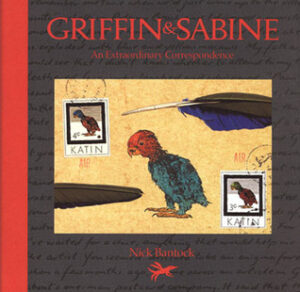 Griffin & Sabine, Nick Bantock
Griffin & Sabine, Nick Bantock
Holy moly, this is lovely. I was urged to get this to do a review on it for Postcrossing (check out my others on the Postcrossing blog!), so it was one of the things I bought with my Christmas gift cards… and I’m glad I did. It’s an epistolary story, showing both the fronts and backs of postcards and — in little pouches, from which you have to pull out actual letters which are handwritten (Sabine) or typewritten (Griffin) — letters sent between Griffin (an artist who creates postcards) and Sabine (an artist who illustrates stamps).
Sabine has been seeing Griffin’s art in her dreams for years, and reaches out to him via a postcard once she finally finds out who he is and how to contact him (through running across his artwork). After just a few postcards are exchanged, she proves to him that she knows his art like no one else can, and they quickly forge a connection despite the physical distance between them. It’s a love story, and a mystery: how are they connected? Why are they connected? What does it mean?
It’s a lovely reading experience; the pouches are a nice gimmick, and they really give you a sense of discovery. I’m not super great with visual detail, but the fronts of the postcards (illustrated by Griffin and Sabine, in the story) and the decorations on envelopes and letters add quite a bit. It’s a very short read, but worthwhile — and that ending! I’ve ordered the next two books.
Rating: 5/5
Tags: book reviews, books, mystery, Nick Bantock, romance, SF/F
Posted January 2, 2021 by Nicky in Reviews / 2 Comments
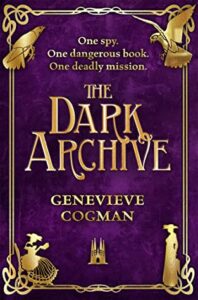 The Dark Archive, Genevieve Cogman
The Dark Archive, Genevieve Cogman
This most recent book in the Invisible Library series features Irene, Kai, Vale, Irene’s new apprentice (Catherine), and Kai’s brother. It’s a very Sparks Will Fly sort of arrangement, not least because Vale is pitted against an adversary, his criminal mirror. A mastermind. A Moriarty — or so it seems. I was a little disappointed that certain characters didn’t interact more (let’s not be coy, I wanted more of Kai and Vale working together), and it feels like the particularly mixture of characters didn’t really have time to mix up and cause mayhem before the book was suddenly over.
That’s partly because recurring themes get tugged on again, and characters that had left the narrative triumphantly returned… some of them more predictably so than others.
All in all, the book sped by at the usual pace, and I ended up pretty happy with the explanations for the way characters are being moved around the gameboard. One very predictable outcome comes in almost at the end of the book, and honestly, it shouldn’t have taken a genius detective to see it. At the same time, the epilogue gives us an intriguing glimpse at deeper machinations and stories yet to come…
Not a favourite in the series, I think, but one which moves the plot along — and is as always a very absorbing and swift read.
Rating: 3/5
Tags: book reviews, books, Genevieve Cogman, SF/F
Posted December 20, 2020 by Nicky in Reviews / 0 Comments
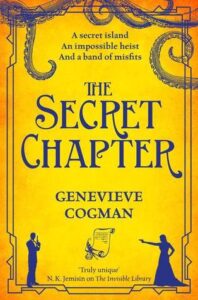 The Secret Chapter, Genevieve Cogman
The Secret Chapter, Genevieve Cogman
Genevieve Cogman has given us a proper heist story! We’ve seen Irene stealing books before, of course; that’s kind of the point. But this book is a traditional heist story, expanding the idea of Fae having archetypes into modern stories about thieves and crime bosses, as well. It’s fun to see Irene with a whole crew, even though this book doesn’t feature Vale at all — and fun to see her and Kai able to work together again.
There’s obviously a bigger plot accumulating, as well, so that though there’s a sort of “monster of the week” feel to the various thefts and negotiations and investigations, slowly the pieces are coming together on other big questions. Alberich was but a bump in the road, seemingly; there’s something even bigger to worry about, between the revelations of this book, the truce promised in the previous book. It feels good that six books in, the individual stories are still engaging — total popcorn for my brain, anyway — and pacy, while an overarching story keeps building at its own pace.
I’m fascinated by Indigo and the position this book puts Kai in; I’m super curious about Irene’s promised new apprentice. I love the way Sterrington has come back into things, and hope to see more of her. And it looks like the next book should see more of Vale again, maybe even at the same time as Kai — a book that’s Kai, Vale and Irene against the world has my full attention.
Rating: 4/5
Tags: book reviews, books, Genevieve Cogman, SF/F
Posted December 18, 2020 by Nicky in Reviews / 2 Comments
 Goldilocks, Laura Lam
Goldilocks, Laura Lam
Oh boy, here I am finally, reviewing this. It’s been a heck of a year, and this wasn’t quite the right book for me earlier this year — I didn’t even get to the pandemic part, it’s just that the portrayal of a world slid out of control was too much for me in general. Goldilocks portrays a future version of Earth with women forced back out of the workplace, climate change out of control, and temperate areas overpopulated and struggling. A small crew of women are heading for a new planet, Cavendish, with the hope of finding and making a new home there, to save everyone.
Things turn out darker than that hope, in a way that’s difficult to talk about without giving too much away. There are some twists that are worth experiencing as part of the story, with its multiple timelines and carefully timed revelations. I’m usually pretty good at guessing ahead, but one or two twists caught me on the hop.
In the end, one particular character came across as a little too straightforwardly villainous for me. I didn’t have an ounce of sympathy for their aims or their choices on the way there, and that sat oddly with my earlier impressions of them. I’d have welcomed something that felt a little more nuanced, perhaps, though I did find Naomi’s reaction to them was nicely ambiguous. The ending seemed to suggest that things were meant to be that way, but after a certain point, they just went beyond the pale for me.
Overall, though, I enjoyed it and would recommend it.
Rating: 4/5
Tags: book reviews, books, Laura Lam, SF/F
Posted December 12, 2020 by Nicky in Reviews / 0 Comments
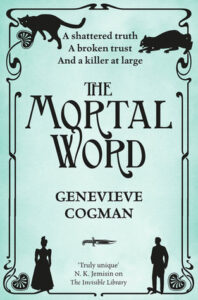 The Mortal Word, Genevieve Cogman
The Mortal Word, Genevieve Cogman
I didn’t love The Burning Page or The Lost Plot as much as I hoped, somehow, and I partly wonder if I just got stalled partway through them, thought about things too much, and jammed up. No such problem with The Mortal Word: this series is like brain candy for me, and I had the time to just swallow it whole… so I did. In this book, Librarians are brokering a peace between Fae and Dragons, and things have been somewhat thrown into disarray by the murder of a trusted servant, a man who was working to make the whole deal come off. Irene is called in, along with Vale… and Kai manages to insinuate himself into things via the Dragon side.
There’s a little more of Kai, Vale and Irene working together in this book, which always helps — they’re an epic trio, and I said not entirely jokingly to someone else that I think they should just all three marry each other and get on with it. There’s also another little opening into the Dragon society in the form of Mu Dan, a judge investigator tasked to assist Irene and Vale from the Dragon side of proceedings. (The Fae tasked to join them is Silver, which also leads to some very fun bits.) But mostly, there’s more of Vale, who is probably my favourite.
I find these books a tiny bit predictable, though perhaps not as predictable as I feared they might be; in a way it comes with the territory, since Fae acting out their archetypes have the most power, and Dragons like order. They just fly by in a sometimes-tropey way that’s delightful to me. I’m glad I’m catching up with the series now!
Rating: 4/5
Tags: book reviews, books, Genevieve Cogman, SF/F
Posted December 9, 2020 by Nicky in Reviews / 1 Comment
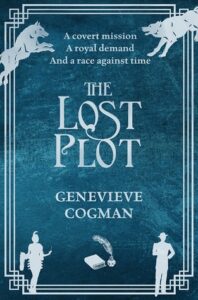 The Lost Plot, Genevieve Cogman
The Lost Plot, Genevieve Cogman
I expected to steam through this on a reread, since these books are totally candy for my brain… but actually I stalled on it halfway through, again. I must conclude again that it’s mostly the lack of Vale — he barely appears in the story, and is barely relevant to the plot at all, which is largely in another world. It’s great that we get to see more of dragon society and Kai’s place within it, and we get some movement on Kai’s arc… and it’s also great to have a different setting for this book (Prohibition-era New York)…
But it really suffered for me without any sign of Vale. Which is greedy, probably; he’s important, yes, but he’s not part of the Library. He’s a human, albeit a convenient one, and tied to a specific world — it’s almost weird he’s managed to be such a big part of the plots so far!
I do still feel unsure about the ending. The will-they-won’t-they between both Kai and Irene and Kai and Vale always felt like a distraction; I was much more excited about the three of them working together in an intense friendship, balancing each other out. Irene and Kai as a couple don’t quite work for me without Vale, and yet he immediately becomes little more than a third wheel there. I’m hoping that feeling will be proved wrong by the next book!
In any case, it is still a lot of fun to run around after Kai and Irene, and to meet another Librarian and more dragons. The change in setting is fun, a reminder that it isn’t all steampunk worlds, and seeing Irene trusted by the Library with a difficult task is great after her shaky start in earlier books.
It’s just not my favourite.
Rating: 3/5
Tags: book reviews, books, Genevieve Cogman, SF/F
 A Wizard of Earthsea, Ursula Le Guin
A Wizard of Earthsea, Ursula Le Guin








